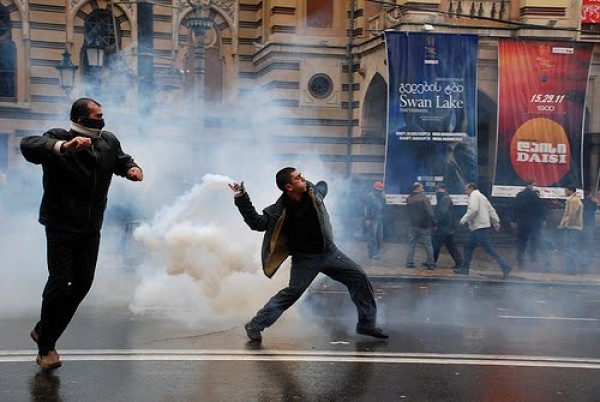-
Whatever Future: Interview with Alexander R. Galloway
by Idiom October 25, 2010

Alexander R. Galloway is an author and programmer. He is a founding member of the software collective RSG and creator of the Carnivore and Kriegspiel projects. Galloway is the author of Protocol: How Control Exists After Decentralization (MIT, 2004), Gaming: Essays on Algorithmic Culture (Minnesota, 2006), and most recently The Exploit: A Theory of Networks (Minnesota, 2007), cowritten with Eugene Thacker. The Unworkable Interface, his Flusser lecture from 2008, has rapidly become an essential exploration of the contemporary tensions between art and politics, form and content. More recently, Galloway has translated, along with Jason E. Smith, Introduction to Civil War by Tiqqun, released this year by Semiotexte. Galloway’s weeklong seminar, French Theory Today: An Introduction to Possible Futures begins tonight at The Public School. Stephen Squibb passed virtual notes with Galloway about Tiqqun, the nature of the political, the continuing significance of French thinking.
Idiom: Let’s start with Tiqqun. You’ve recently translated their Introduction to Civil War, which you and I and several of our closest friends recently discussed. How did you first learn about Civil War?Alex Galloway: I learned about Tiqqun from a short translation of excerpts from Civil War that Jason Smith did for the Brooklyn ‘zine that he co-edited called Soft Targets, sadly now defunct. I was also living in France in 2008 and had a chance to learn a bit about Tiqqun and some of the new political and theoretical writings being produced over there. Jason and I struck up a friendship over email and eventually decided to go ahead and translate the entire book, since at the time there was almost nothing available from Tiqqun in English. This was before the The Coming Insurrection was published (written by a group calling themselves The Invisible Committee, but often lumped together with Tiqqun). Since then Tiqqun, the Invisible Committee, and other related groups have received a fair amount of attention, and today it is relatively easy to find bootleg translations of most of their texts online.
Idiom: How would you characterize these works? What interests you about them?
AG: It would be easy to call these works “neo-situationist,” as I and others have admittedly been sometimes tempted to do. There is indeed some superficial similarity between some of the Tiqqun writings and those of the Situationist International. But Tiqqun is really quite different and this is most apparent in the attention they give to the historical period. In their piece on the “cybernetic hypothesis,” for example, they describe the political and social formation that took root at the beginning of the second half of the twentieth century. Or in their book on the figure of the “Bloom,” modeled loosely after Leopold Bloom of Joyce’s Ulysses, we find modern man lost in a sea of flexible networks and neo-liberal apparatuses. Tiqqun is certainly inspired by previous figures – including Giorgio Agamben and Guy Debord – but they have made their own contribution to an older political discourse by evolving existing concepts such as the “form-of-life” or the “whatever singularity,” in addition to developing new ones such as the “human strike.” Tiqqun also maintains a defiant streak that I really appreciate, particularly in their blanket hatred for all forms of academic and institutionalized discourse. They know what they think of the contemporary world and they know what they want to do about it.
Idiom:What do they want to do?AG: I mean that in a very straight forward manner. They know what they want to do and and what they want to say. Much of intellectual life today consists of timidly regurgitating existing theories and positions. Tiqqun is willing to experiment, both formally and substantively. So they are not uncomfortable talking about real political change or about how life ought to be lived. And they are not uncomfortable saying that something is a rotten stinking mess, if it is a rotten stinking mess.
Idiom: Excellent. Can you speak a little about what the working process of this project?AG: Jason had been in touch with some of the members of Tiqqun for some time when I got on board, and this was still before the Tarnac arrests. I remember thinking that they were a bit cloak-and-dagger over email. They used pseudonyms and changed email addresses frequently. Then I woke up one morning and read about their arrests, which certainly justified their caution! Much of the translation was done right around the time of the arrests and we were in email contact with their representatives throughout. It is important to realize that Tiqqun and The Invisible Committee are different groups with different projects and different agendas, but these realms nevertheless overlap in significant ways. They did a complete edit on our final translation, correcting many errors, and shaping the tone to echo the original French. The whole process was carried out virtually.

Idiom: The politics here are fascinating to me. On the one hand, Tiqqun is very clearly ‘political’ in the sense that they are addressing issues of power and its organization, and these reflections alone have been enough to attract the ill-will of the authorities. On the other hand, though, reading their work, its not typically political in the sense we understand it in this country. To what extent does the national context play in shaping both Tiqqun’s politics and our reception of it?AG: Tiqqun does not follow the traditional identity of the left. They reject, for example, the notion that there should be political parties (vanguard or otherwise) to negotiate the relationship between the working and ruling classes. Indeed, they reject the entire tradition that designates the working class as the subject-object of history, capable of leading humanity to freedom. These are at best convenient myths, beastly traces of a bygone era. Empire has changed everything. Today the state functions differently, having proven itself entirely amenable to all hitherto constructions of identity, revolutionary or otherwise. Thus Tiqqun is engaged in reinventing many basic philosophical categories from the ground up. This is why, perhaps, their work may not appear ‘political’ in the traditional sense. By proposing new definitions of the person and of the community, they offer a wholesale rejection of contemporary “society” (a word dripping with scorn in Tiqqun). All this makes their work political.
Idiom: How do you see Tiqqun fitting in to the contemporary constellation of French thought, some of which you are teaching this week at The Public School (disclosure: I sit on the committee for TPS -SS) ? Are there overlaps? Or are these currents pretty distinct?
AG: Tiqqun would certainly blanch at the suggestion that they are doing philosophy, and as you know “French Theory” is largely an American invention, applied somewhat retroactively. This is one of the reasons why I chose not to devote a session to Tiqqun in The Public School seminar. Though not anti-intellectual by any means, the Tiqqun group certainly does disdain organized scholarly pursuits in favor of more direct criticism and immediate action. I respect them for this. That said, there might be some overlaps, yes, even if quite remote. For example there seems to be a trend toward political withdrawal and the denuding of the self. Tiqqun is influenced by Gilles Deleuze and Agamben’s concept of the “whatever.” And they likewise share an interest in the “community of those who have nothing in common.” This has been on the lips of writers like Agamben, yes, but also Jean-Luc Nancy and Maurice Blanchot, as well as Michael Hardt and Antonio Negri. (Although Tiqqun are ultimately rather dismissive of the latter’s project, even if they import their concept of “empire” wholesale.) So we might say that the “fog” of the social is a target as much for Tiqqun as it is for François Laruelle (who would do away with the social entirely, as well as all perceiving beings in it) or even Quentin Meillassoux (who seeks out an absolute beyond the old Kantian contract forged between subject and object). But these are all rather flimsy comparisons at best. Tiqqun would have nothing to do with Meillassoux or Laruelle or, I would guess, any other professional philosopher. Theirs is a politics first and a philosophy second.
Idiom:So the thinkers this week are all professional, in that sense? How did you encounter their work? Are there threads that connect them?
AG: Yes, all professional. All except Mehdi Belhaj Kacem who fashions himself an “anti-philosopher,” although that may be more about style and affiliation than anything else. Catherine Malabou and Bernard Stiegler share a number of things in common, not least of which their common relationship with Jacques Derrida (with whom each has written a book) and a mutual interest in Martin Heidegger. Meillassoux and Laruelle are both extremely technical thinkers writing with a high degree of precision. By contrast Belhaj Kacem is a very associative thinker, working moment by moment, and with a great facility with popular culture; which the others lack, to some extent.

I encountered these thinkers in the predictable ways. I learned of Meillassoux and Laruelle from Ray Brassier who has translated and written on both figures (and was kind enough once a few years ago to let me pepper him with what was probably an endless series of naive questions). The British philosophy journal Collapse was also key in giving a number of these authors exposure in English. It is the only philosophy journal worth reading right now. Malabou I learned about through the French publication Fresh Théorie as well as her impressive book on Hegel. As for Belhaj Kacem, it was mostly luck, first via reading his ex-wife – the French novelist Chloé Delaume – and also because he had a brief period of collaboration with the Tiqqun group. Alain Badiou is also something of a kingmaker here, since he has endorsed both Belhaj Kacem and Meillassoux by publishing them in his book series. Stiegler is the only one of the five who has been relatively well known in the English speaking world for a few years now. The first volume of his Technics and Time came out in English already in 1998, and has been read widely by people interested in theories of media and technology. And there is also the pivotal role he plays in the film The Ister which piqued my interest.
Idiom: You’ve sub-titled the seminar “an introduction to possible futures.” Can you speak a little about this formulation?
AG: I was inspired by a special issue of the journal Angelaki that Peter Hallward put together in 2003 under the banner of “French Philosophy Today.” The generation of philosophers who came of age around May 1968 have been so influential here in American and elsewhere, culminating today in the attention given to figures like Badiou and Jacques Rancière. But the goal of this seminar is not to focus on well known authors. I wouldn’t put too much stock in the notion of “possible futures,” since that’s just a marketing ploy. Although admittedly Malabou speaks of the “future of Hegel” and Laruelle the “future Christ.” The issue for me is less conceptual than merely practical. Here are five figures who are either mostly unpublished in English (Belhaj Kacem and Laruelle) or who have only recently begun to appear in translation (Malabou, Stiegler and Meillassoux). The goal is not to predict a future, and certainly one has no interest in proscribing some sort of new philosophical syllabus. But it is nevertheless clear that the most interesting philosophical work being done today is still happening in France, and this seminar is simply an opportunity to continue to engage with it.

